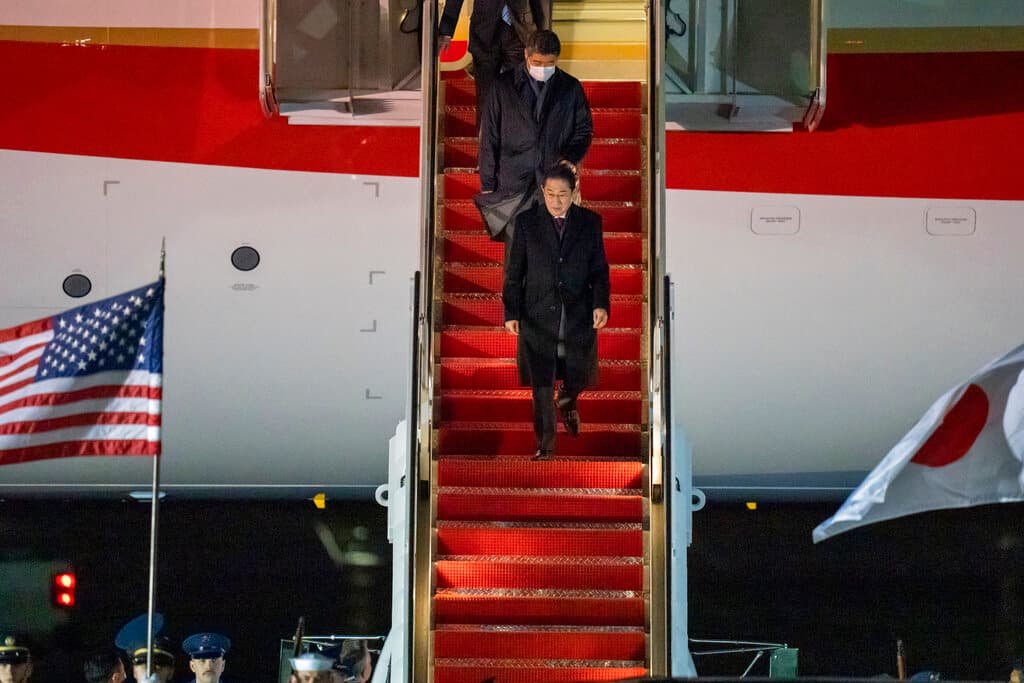Biden-Kishida Parley Marks Transformational Moment for Japan
To jointly face difficult strategic choices, Washington needs to understand Japan better politically and culturally.

Prime Minister Kishida’s meeting today at Washington with President Biden reflects his goal of transforming his nation’s strategic culture in response to threats from Communist China and North Korea, as well as Russia’s invasion of Ukraine.
Late last year, the Kishida government released three national security and defense-planning documents that collectively mark a turning point in Japanese history.
For the first time since the end of World War II, when the United States imposed a pacifist constitution upon Japan, Tokyo deems its military capabilities essential for protecting Japan, keeping the peace, and promoting international order.
The challenges America and Japan face have turned a once-reluctant Japan into our most important ally. But given the stakes in the Indo-Pacific, Messrs. Biden and Kishida should take clear steps to ensure that Japan becomes our closest ally.
Major enhancements have already taken place but it’s time to go further. The Biden team has built on the Trump administration’s legacy on Japan, which included revitalizing the Quad and deepening its focus on deterrence and economic security, and therefore Japan is one of the few policy areas in Washington where bipartisanship reigns.
Still, we in Washington need to understand Japan better politically and culturally to build the seamless relationship of trust necessary to jointly face difficult strategic choices. The Biden-Kishida summit should lay the groundwork for a policy of ever-closer cooperation.
That would start with redoubled efforts to promote people-to-people exchanges at the same level as those that have long characterized America’s relations with Europe. Establishing a new, annual Congress-Diet retreat will foster cooperation and deepen personal relationships among a new generation of politicians.
We can also do more to encourage Japanese students to study at American universities; Japanese enrollment at American colleges has plummeted over the past two decades, in part because of the skyrocketing cost of tuition.
We also need to deepen scientific and technological cooperation. Japan has important and growing capabilities in quantum computing, supercomputing, and hypersonics — and is increasingly focused on such national security areas as intelligence, surveillance, and reconnaissance.
As Japan enhances cybersecurity, information security, and industrial security, a deeper partnership with the security pact between Australia, the United Kingdom, and America, has the potential to rapidly enhance maritime security in the Indo-Pacific.
As we bring Japan closer to that security pact, we should also increase Japanese participation in the Five Eyes intelligence partnership among America, Britain, Australia, Canada, and New Zealand.
Improved cybersecurity and security-clearance systems would afford Japan greater access to necessary intelligence and allow Tokyo to share its own excellent intelligence and analysis more freely. Over time, Japan could become a candidate for accession to the Five Eyes.
We also need to deepen U.S.-Japan-Taiwan communications and coordination. Japanese and Taiwanese officials have reportedly communicated unofficially in the past few years. But unlike America, Japan has no official means to share intelligence or coordinate responses in case of an attack on Taiwan or Communist Chinese gray-zone activity.
As of now, all sensitive communications between Japan and Taiwan would need to pass through America. We should discreetly encourage direct channels of communication between Tokyo and Taipei.
Meanwhile, the relationship between South Korea, Japan, and America is critical for meeting the North Korea threat and other security challenges. Yet historical grievances between Japan and South Korea have prevented the trilateral relationship from meeting its potential.
President Yoon Suk-yeol of Korea and Mr. Kishida have made major efforts to improve relations, however. The security-focused Mr. Yoon has supported Japan’s military buildup, voiced deep concern about North Korea’s nuclear missile program, and stood with America and Japan against changes to the status quo in the Taiwan Strait.
A forward-looking Japan-South Korea relationship would bolster America’s defense capabilities and reduce the risk that Communist China can push neutrality on — or “Finlandize” — South Korea over time.
We also need to build on Japan’s successes. For decades, Tokyo has focused on outreach to Southeast Asia and the Pacific Island nations, which face significant economic and security threats from Communist China. The United States can work alongside Japan to deepen economic engagement with the region.
Washington should also become a candidate for accession to the Comprehensive and Progressive Agreement for Trans-Pacific Partnership, which Japan championed and built after America left the partnership in 2017.
The Ukraine crisis and the rise of China has led to a growing awareness in Washington and Tokyo of their unmatched importance to each other. Now comes the alliance’s next test: enhancing trust on shared principles and interests, and deepening coordination at all levels. Messrs. Biden and Kishida have an opportunity to take a big step. They look like they’re ready.
